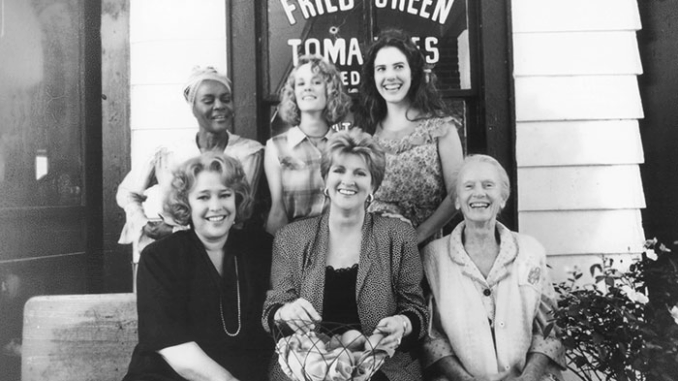
At its core, Fried Green Tomatoes is not just a film about friendship, love, or even food — it’s a film about stories, and how telling them — and hearing them — can save a life.
Whether it’s Ninny recounting the lives of Idgie and Ruth, or Evelyn discovering her own power through those tales, storytelling in the film functions as more than memory. It becomes a survival strategy, a lifeline, a blueprint for transformation. These aren’t just tales of the past. They are tools for reclaiming identity, dignity, and purpose.
Let’s explore how Fried Green Tomatoes uses storytelling not as nostalgia, but as emotional survival, psychological healing, and even rebellion.
Ninny as a Story Weaver: Creating Safe Space Through Memory
When Evelyn stumbles into the nursing home and meets Ninny Threadgoode, she doesn’t expect her world to be shaken by an 80-something-year-old woman with a soft voice and a sharp memory. But Ninny is more than an old lady reminiscing — she’s a storyteller in the oldest tradition: a griot, a keeper of truth, a spiritual midwife guiding others through emotional rebirth.
Through the tale of the Whistle Stop Café and the women who ran it, Ninny isn’t just entertaining Evelyn — she’s inviting her into another life, one where women fight back, take risks, love deeply, and laugh loudly. The stories become a safe emotional container, allowing Evelyn to examine her own dissatisfaction without confronting it head-on.
Psychologically, this is a form of narrative therapy — a technique where we heal by reshaping the stories we tell ourselves. Ninny’s narrative provides Evelyn a mirror, and more importantly, a map.
The Story as Resistance: Idgie Threadgoode and the Myth of Freedom
Idgie’s story, as told by Ninny, isn’t simply a biography — it’s a mythic retelling, almost like folklore. Idgie becomes larger than life: she wrestles with grief, stands up to racists, runs a café, drives with bees, and rescues people in distress. Whether or not every detail is factually true, the emotional truth resonates.
Idgie represents the part of every woman who wants to break the mold — to reject gender roles, refuse submission, and live on her own terms. Through storytelling, Idgie becomes an archetype of defiance.
In this way, Ninny’s stories aren’t just memory — they are rebellion. They push back against a world that told women to be quiet, polite, and invisible. They say: You can be wild. You can be loyal. You can love how you want. You can fight.

Evelyn’s Transformation: Finding Her Voice Through Fiction
As the stories unfold, Evelyn doesn’t just listen — she begins to change. Each tale from Ninny plants a seed of courage inside her. She starts asserting herself more. She smashes a car in a parking lot and screams “Towanda!” — the warrior name she invents for her new self.
This moment is both comic and cathartic. Evelyn is rewriting her internal script — the one that told her she was too old, too fat, too useless. She’s crafting a new identity: fierce, fearless, and free.
The stories function here as emotional rehearsal. They allow Evelyn to imagine a different version of herself before fully becoming her. In psychology, this is akin to visualization therapy — where we practice new behaviors in a safe mental space before acting them out in real life.
Stories as Connection: Bridging Generations, Healing Loneliness
Both Evelyn and Ninny are lonely when they meet — different kinds of lonely. Evelyn is emotionally isolated within her marriage, dismissed by her husband, and trapped in middle-aged invisibility. Ninny is physically isolated, living in a nursing home, her family largely gone or forgotten.
But through storytelling, they build a bridge.
Psychologist Viktor Frankl, a Holocaust survivor and the father of logotherapy, wrote that “those who have a ‘why’ to live can bear almost any ‘how.’” For both women, storytelling becomes that “why.” It gives their days shape, meaning, and connection.
In a way, the stories are not just about Idgie and Ruth — they are about Evelyn and Ninny. About how women, across time and class and age, keep each other alive through empathy, memory, and laughter.
The Unreliable Narrator: The Power of Ambiguity
One of the most delicious questions in the film is this: Is Ninny actually Idgie? The film dances around the idea, dropping hints but never confirming. Whether it’s true or not, the ambiguity adds psychological depth.
If Ninny is Idgie, she’s retelling her own life through the safety of a third person — a common trauma response. By placing her pain, her losses, and her love for Ruth in another “character,” she can process it with distance, avoid judgment, and perhaps even protect Evelyn from the full weight of her truth.
If Ninny is not Idgie, then her storytelling is an act of emotional inheritance — passing on a legacy that she witnessed and believed in, even if it wasn’t hers directly.
Either way, the power of the stories remains. They comfort. They provoke. They heal.
Storytelling as Immortality
In the final moments of the film, as Evelyn visits Ruth’s grave and reflects on Ninny’s tales, we realize something profound: the people in the stories have become real to her. They live on, not just in memory, but in behavior, spirit, and attitude.
Psychologically, this speaks to symbolic immortality — the idea that people don’t only live through genes or graves, but through impact. Through the lessons they teach. Through the stories they leave behind.
Ruth is gone. Idgie may be too. But they are alive in Evelyn. And through Evelyn, in us.
Stories That Nourish the Soul
Fried Green Tomatoes is, above all, a reminder that we live in the stories we tell — and the ones we listen to. Whether whispered in a nursing home, shouted in a parking lot, or shared over fried green tomatoes, stories are how we survive.
They hold our pain. They pass down our strength. They offer escape, comfort, rebellion, and truth. They remind us of who we were — and who we still can become.
And in a world that often tries to silence women’s voices, the stories in Fried Green Tomatoes do something radical:
They let women speak.
They let women remember.
They let women live forever.
